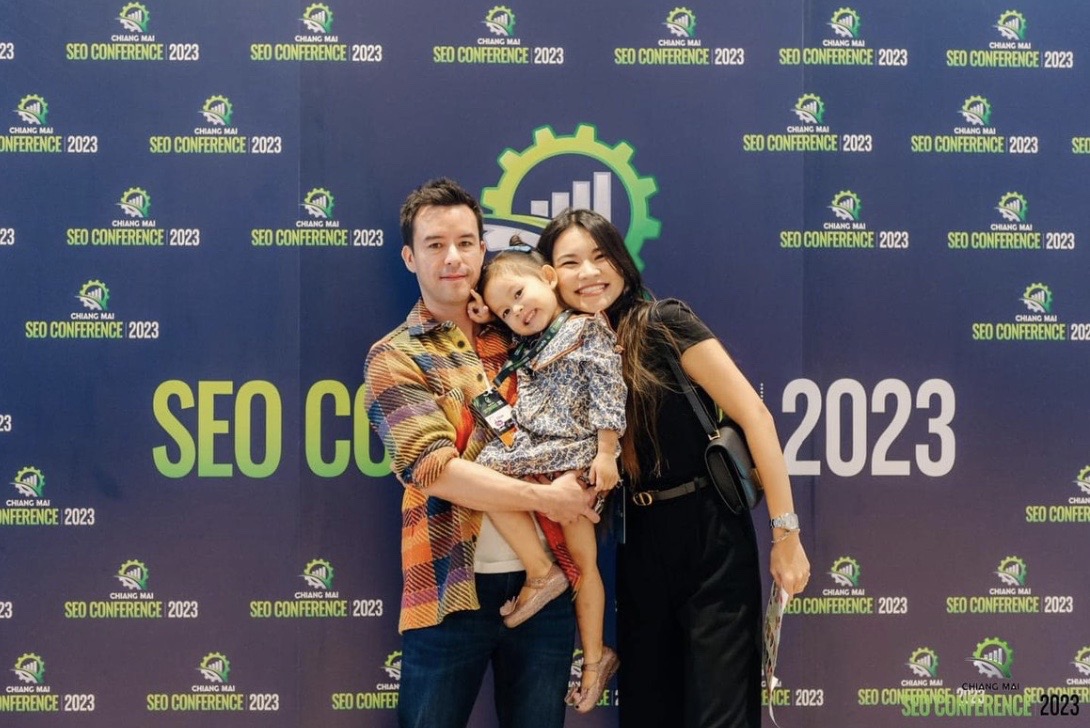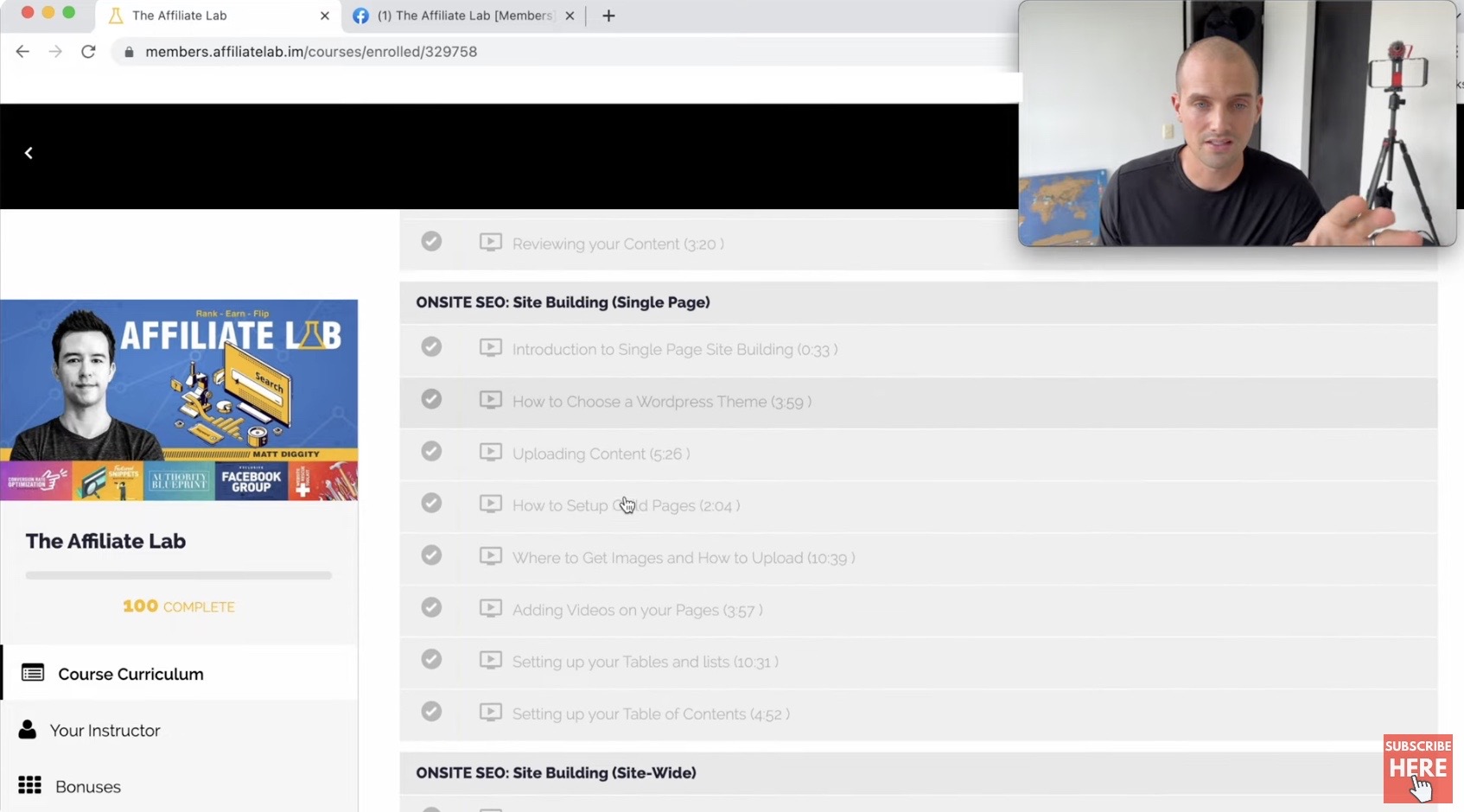Matt Diggity takes a different approach to online entrepreneurship by ranking, monetizing, and flipping competitive affiliate websites. His business strategy combines affiliate marketing and search engine optimization. He claims that a site that makes $10,000 monthly could sell for $350,000 once it’s ranked on Google. Matt partners with affiliates around the world, teaching them how to build and rank niche affiliate sites. Is Affiliate Lab the course you need to make big bucks online?
As a stay-at-home mom, juggling kids and a side hustle while maintaining a clean home, I need a low-maintenance but quick-income biz. Matt Diggity offers a business opportunity that makes a lucrative monthly income through a strategy called Affiliate SEO. But is it the best online hustle for stay-at-home moms? This Affiliate Lab review covers the details of the course, Matt’s personal and professional background, and the challenges of the business model.
Affiliate Lab is an affiliate SEO course that teaches how to make money online by flipping average-earning websites. The goal is to rank and flip niche sites, bring traffic, and increase monthly sales by up to 40 times. This course is a 45-hour training on affiliate SEO, with 6 templates, SEO tools, SOPs, checklists, and bonus lessons. Affiliate SEO is an umbrella term for various search engine optimization strategies applied in the affiliate marketing biz. It combines two profitable business models: affiliate marketing and SEO. Affiliate Lab costs $997 for straight payment or two installments of $597. On some Black Friday sales, the course is offered at 50% off or $200 off the list price. There are no refunds. The course is comprehensive and includes lessons on
- Niche selection,
- on-site and off-site SEO,
- conversion rate optimization (CRO) by maximizing CTAs,
- authority niche and how to create backlinks and,
- practical techniques on how to get a site unstuck on Google.
Matt Diggity is an affiliate marketer, SEO expert, founder of Diggity marketing agency, and the creator of Affiliate Lab. His LinkedIn says he finished an electrical and electronic engineering degree at UC San Diego in La Jolla, California, where he also earned his master’s. After college, he worked as an engineer for a start-up company called Silicon Valley and learned digital marketing there. He got so burnt out from this 9-to-5 job. In 2009, a friend introduced him to affiliate marketing and website ranking. He improved his SEO skills and worked on his affiliate sidelines after work. He finally quit his job in 2011 to become a full-time online entrepreneur. LeadSpring LLC, his affiliate SEO agency, was launched in 2015. They partner with affiliates to increase site rankings and conversions. He also owns Diggity Links, a monthly private blog network (PBN) link subscription service. The Search Initiative was added to his business portfolio in 2017. It’s an SEO agency that offers white-labeled and DFY search engine optimization services. He travels to 32 countries to teach affiliates how to use SEO on ranking websites. Matt’s SEO mastery is recognized around the world. He recently spoke at the Chiang Mai SEO Conference. It’s an annual SEO event attended by over 800 entrepreneurs, super-affiliates, and agency owners at the Le Meridien Hotel, in Thailand.

Affiliate Lab and Affiliate SEO Business Model
Affiliate Lab has a unique course offering that combines the power of SEO and the earning opportunity of affiliate marketing. It’s unlike many affiliate courses that offer a one-size-fits-all solution for driving traffic to affiliate links. Despite having an engineering education and work experience, Matt learned the basics of SEO through passion and dedication. He continues to improve and adapt to new changes in the Google algorithm. His YouTube channel is packed with valuable information. He is one of the first SEO strategists to fully embrace artificial intelligence in optimizing and ranking websites. His recent popular uploads on his channel are on AI topics like how Chat-GPT can outperform 10 SEO experts, 8 niches for AI, and how to write undetectable AI content that Google loves. Matt didn’t seem to be shaken when Google announced its plan to add AI-generated answers to SERPs. He explained that this change wouldn’t rob website builders of their business. Instead, it’s a business opportunity because self-generated experience (SGE) has limitations and will direct readers to top-ranking articles for further reading.
What I like about Affiliate Lab is that Matt Diggity is an authority in his niche. He knows Affiliate SEO so well that people look up to him for SEO strategy updates. In one of his episodes, he shares Google strategies that drive traffic like keyword search using the Surfer tool. He also explains how to write copies that Google’s algorithm can easily pick up. Matt explained the importance of having a link-building plan and used his own as an example. He revealed that 40% of his links are guest posts, 30% are link insertions, 15% are health reporter out (HARO), 10% are digital PR, 3% are directory citations, and the last 2% are link exchanges.
Affiliate Lab is a great course for affiliates who want to understand how SEO works. However, it’s a little too technical for beginners without prior SEO knowledge. Newbies might get too overwhelmed with all the terms and concepts explained in the Affiliate Lab course. Matt talks about concepts like topical maps and backlinks for optimizing articles. These would be great lessons for advanced-level affiliates, not newbies. Affiliate website flipping could be a profitable business, but it’s not for everyone. It’s twice as challenging as affiliate marketing because there’s an SEO aspect to it. According to Dynu In Media, only 5% of new affiliates become successful and only 1% make a 6 to 7-figure monthly income. Factoring in SEO, this course would be almost impossible for newbies to implement and monetize.
Matt teaches a method that flips affiliate websites that earn $10K monthly and sells them for $350K or more using SEO strategies. Theoretically, this business model could work. However, the challenge would be following the steps that Matt teaches in the Affiliate Lab. SEO cannot be fully mastered through a 45-hour online course. It will give a glimpse of how sites are ranked in Google. But mastering this skill would take time. A study by Semrush conducted on 28,000 domains found that only 7.28% had content that ranked on Google in a 13-month period. Another study by Ahrefs found that it takes approximately 61 to 182 days to rank in the SERP's top 10. Within the time frame, 95% of the sites studied didn’t make it to the top of Google. These findings suggest that ranking, monetizing, and flipping affiliate sites is a lot harder than Matt claims it to be.
Ranking websites on Google is an art and science. Learning the theories through a course like Affiliate Lab is a good start. The affiliate SEO business model could work, and it has scalability potential. However, monetizing this skill by flipping affiliate websites would take time and expertise. Matt Diggity’s course offers comprehensive theoretical SEO learning. It’s a steal if you’re an existing online entrepreneur whose business relies on ranking. I wouldn’t recommend this to beginners who have zero SEO and affiliate experience. With so many aspects that need to be factored in, learning concept and terminologies is just not enough. It will help you improve your SEO strategies and probably rank you bit higher on Google. But you’ll need experience to flip websites that sell for $350K or more.
Affiliate Lab Review on YouTube

The reviewer commends Affiliate Lab for being an extensive course, covering a wide range of topics from niche selection, and on-site and off-site SEO, to content creation and site architecture. He also notes that the course is beginner-friendly and uses advanced strategies and practical tools. What he doesn’t like about this course is that some of its content is outdated and the modules are inconsistent. He suggests that the course could be improved by constantly updating modules to keep up with the latest improvements in SEO and digital marketing.
Is Affiliate Lab Good For Moms?
Affiliate Lab can be a good course for moms. However, there are inherent challenges to the business model, like its complexity and time demand that moms should consider before diving in. Affiliate marketing is a saturated market. The United States has the largest population of affiliate marketers, with an industry value of $6.8 billion. Another challenge of this business model is the frequent algorithm changes. Keeping up with the changes in algorithms could be costly. And, it could also take hard work and frequent maintenance.
There’s a similar but less complicated business model called local lead generation. It’s a better alternative to affiliate SEO because it’s easier to learn and it’s low maintenance. Local lead gen earns in multiple ways, including renting ranked sites and selling leads to local business owners. Unlike the niche-specific affiliate SEO business model, local lead gen is suitable for all industries. So, the market is bigger. Instead of learning two concepts (SEO and affiliate marketing), you only need to learn how to build and rank sites. Income is passive and predictable and profit margins are at least 85%.

0 comments